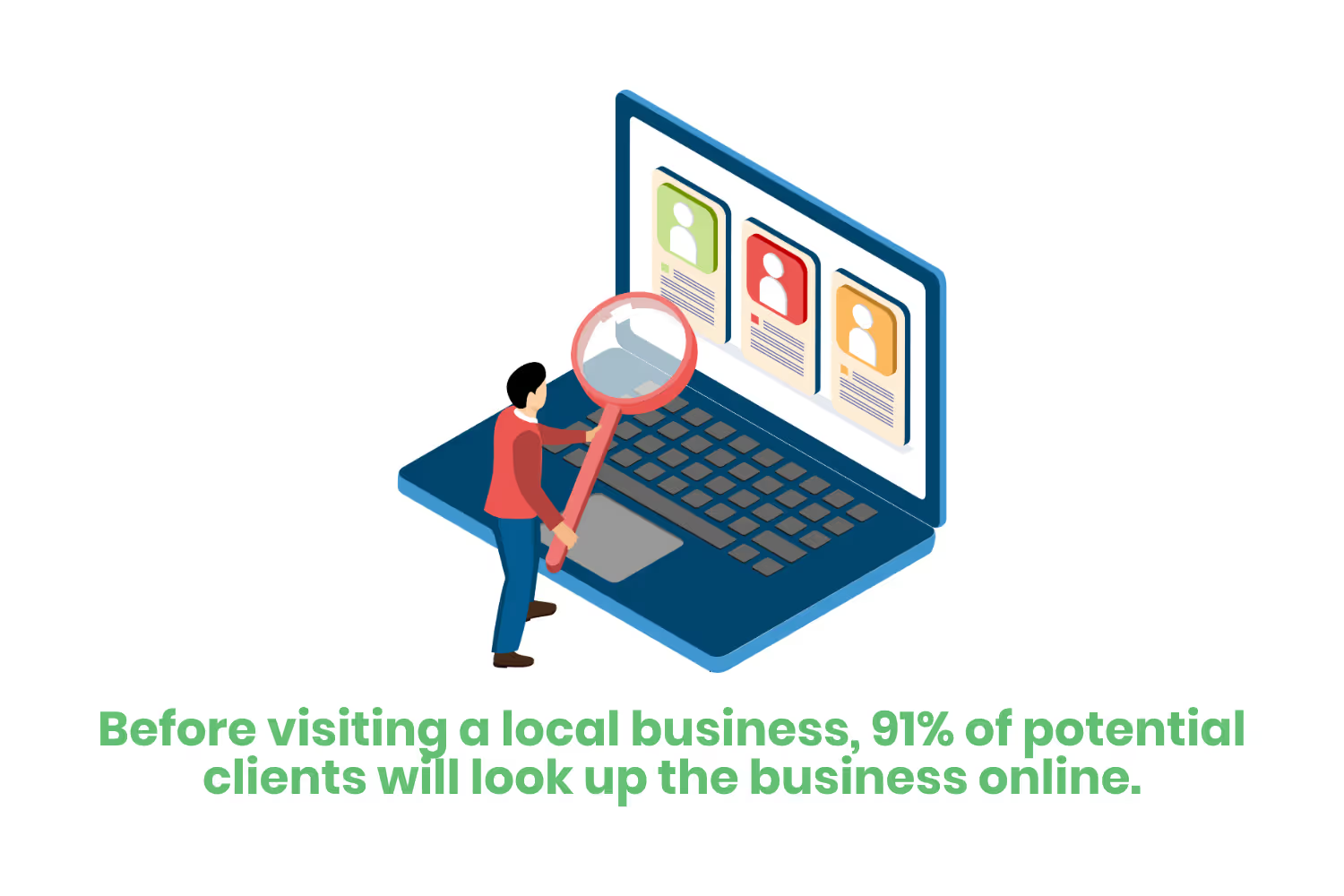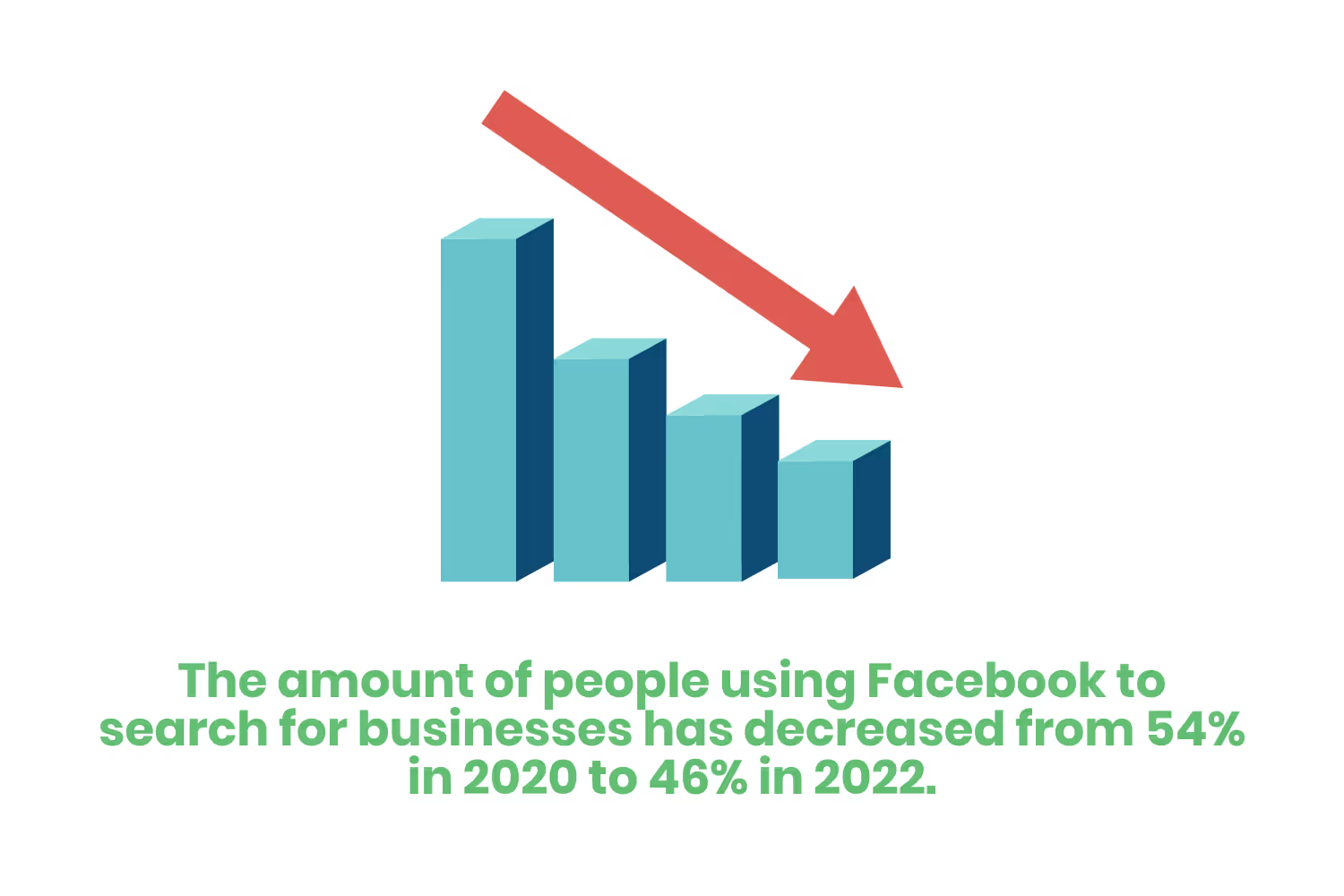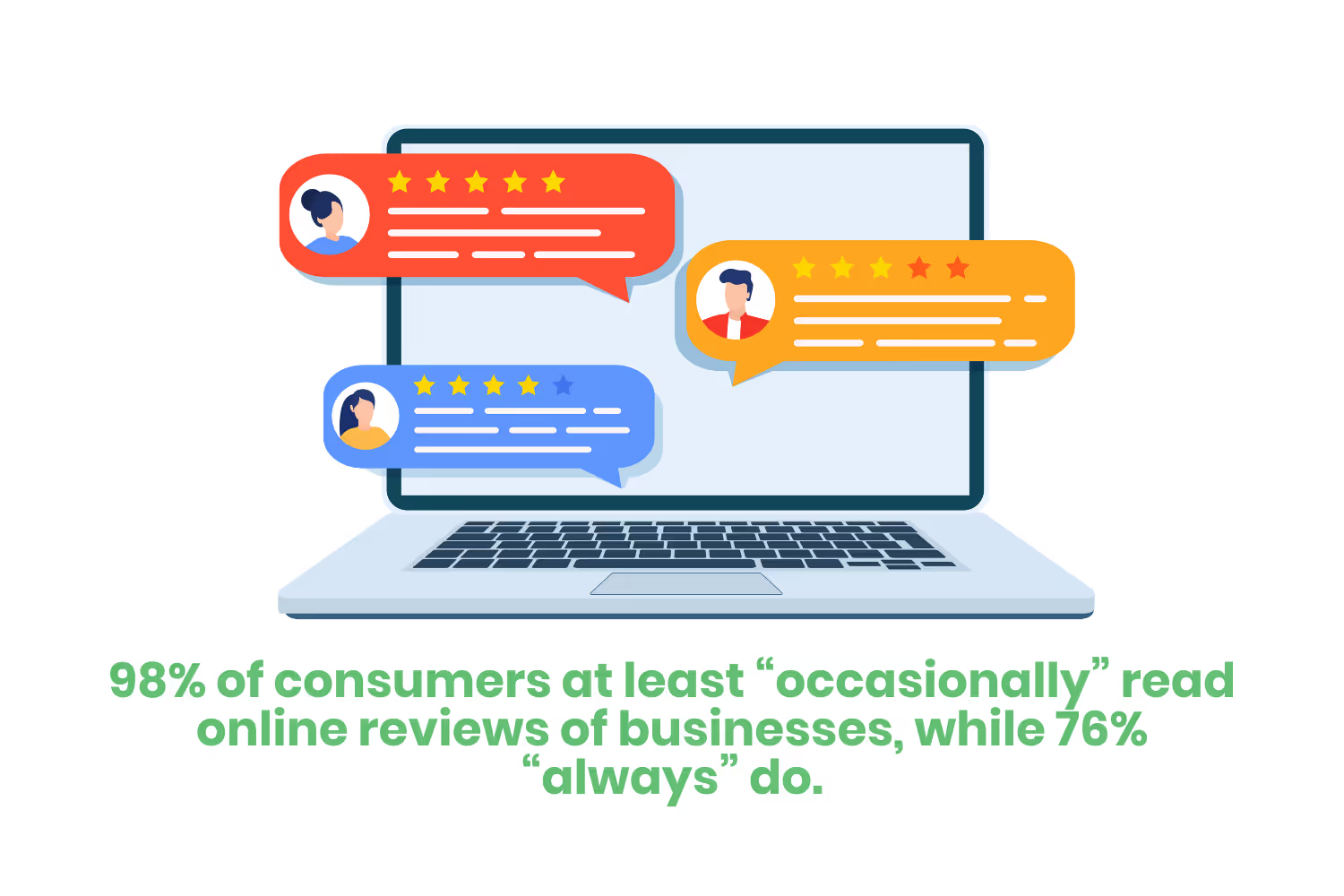Legal-Ease: 14 Attorney Website Design Steps & Benefits
You see, a well-designed website not only helps you establish an online presence, but conveys a sense of professionalism, credibility, and trust in potential clients. Let’s go over the benefits of having a website as an attorney as well as some helpful website design tips and tricks!

Before visiting a local business, 91% of potential clients will look up the business online. The same study from Digital.com shows that 68% of these shoppers want to see a website dedicated to the business they are looking for. This is to (hopefully) get more information, leading to a more confident purchase.
Some business owners might think that a Facebook page or an Instagram account will suffice as their online presence, but this is far from the truth. In fact, Digital.com shares that only 44% of consumers who look for a particular business rely on social media pages alone. The amount of people using Facebook to search for businesses has only decreased from 54% in 2020 to 46% in 2022.

Consumers want to know that they’re getting their money’s worth in their investments, and that’s true for even the simplest of products and services. Now imagine the stress of finding the right attorney. If there was ever something you’d want to be confident in, it’s choosing the right legal counsel.
You could be the best lawyer in town, but if no one has heard about your firm, and you don’t have a way for them to learn more about you, you’re not likely to get clients. At least, not compared to the guy down the street with a website.
You see, a well-designed website not only helps you establish an online presence, but conveys a sense of professionalism, credibility, and trust in potential clients. Let’s go over the benefits of having a website as an attorney as well as some helpful website design tips and tricks!
The Benefits of Having a Website for Your Law Firm
I already went over some of the benefits of having a website as a business owner: professionalism and credibility being two of the most important.
I know you can’t just take what people say at face value, though. As an attorney, I’m sure you already know that. After all, who am I but just a random stranger on the internet? So here is a more in-depth look at why and how a website will profit you…
- Global Reach and Accessibility - Wouldn’t it be best if you worked 24/7? Absolutely not, I’m kidding. But what if you could reap the benefits of having your business open all of the time? You’d get more clients, thus making more revenue. That’s what a website can do for you! Let your website act as a digital storefront/receptionist. So when you’re out of the office, they can still get their questions answered and find out more information about the services you offer. Not to mention, anyone in the world can find this storefront and give you their patronage!
- Credibility - Whether we want to admit it or not, humans are very visual creatures. That’s why we dress our best when trying to impress on first dates, important interviews, etc. The same goes for how we present ourselves online. Your website has the ability to introduce your business to newcomers as credible and professional, just by how it looks. Add valuable content and this demonstrates your expertise in your field of work, making you an easy choice for any potential client.
- Cost-Effective Marketing - Having a website means you get to utilize free/affordable marketing strategies. Reaching a broader audience has never been easier with digital marketing strategies such as search engine optimization (SEO) and social media marketing.
- Analytics and Insights - Manage and track metrics through your website such as traffic, conversion rates, and user demographics to better reach your ideal audience. Having insight into your customer behavior and preferences allows you to make better-informed decisions when it comes to marketing, therefore leading to business.
- Adaptability - Feel free to add to or update your website at any time. Want to keep up with new industry trends? No problem, consider writing a new blog (or starting one) to show your practice is able to evolve with the times. Offering a new service? Great, let everyone know on your home page! As your business grows, your website can grow with it to better accommodate the influx of traffic.
Of course, these aren’t ALL of the benefits of having a business website, but you get the idea! So now that you’re chomping at the bit to get started, let’s go over some beginner tips for creating your very own website.

How to Build a Great Website for Your Law Firm

Emphasize Professionalism
Let people know you mean business! Show off your professionalism by keeping your site tidy, organized, and conservative when it comes to the design. Overcrowding your site with pictures, text, and videos can look messy and leave visitors confused.
Make sure to keep a simple color palette with hues that either help display your brand or that exude a sense of calm and trust, like blues and purples.
Mobile Responsiveness
More and more internet users have their smartphones at the ready whenever they need to look up something. That’s why making sure your website is mobile-friendly is going to be so important.
Making sure your web design can adapt to different screen sizes can help:
- Streamline experience across different devices.
- Help you achieve a positive ranking signal.
- Improve your mobile conversion rate.
- Improve user experience.
- Offer a faster download speed.

Clear and Accessible Navigation
This kind of goes with the whole “keep your site looking professional” section, but I want to specifically talk about ensuring easy navigation for your visitors.
No one wants to have to dig through a website to find the most basic information.
That’s why including clear labels for menu items to help your potential clients navigate your site is essential. Adding items such as “Services”, “About Us”, and “Contact Us” are great ways to direct your online traffic.
Highlight Your Expertise
Remember when I mentioned that having a website is essentially free advertising? Allow me to shed a little more light on that statement.
Instead of taking out expensive ads on television or paper, you can provide detailed information about your knowledge and skills on your “Services” page. This kind of exposure helps you to create and share your company brand at a fraction of the cost.
Make sure to also include a page to introduce yourself. Potential clients want to know who they are going to be working with and if they can feel comfortable around them. Especially when seeking legal advice.
Along with your bio, include a portrait of yourself that is professionally taken, but don’t be afraid to crack a smile! Looking too serious and unapproachable may only steer traffic away from your site.
Client Testimonials and Case Studies
According to a study by Brightlocal, 98% of consumers at least “occasionally” read online reviews of businesses, while 76% “always” do.
Having a client testimonial and/or case study section on your site highlights your past success and can help build trust in any potential client visiting your page.

Contact Information
This one might be a no-brainer, but I’ll go over it anyway. Make sure people know how to contact you! Ideally, you have a “Contact Us” section at the top of your homepage.
Clicking on that should take you to a designated contact page which should include a form for potential clients to fill out, your phone number, office hours, email address, and your office address.
Make sure your number, email, and office address are also displayed on the footer of your website.
Speed and Performance
In today’s day and age, waiting is just not an option. Well, it is… but people aren’t usually happy about it. Instant gratification is the name of the game, especially when it comes to technology. We aren’t using dial-up anymore, so there’s really no reason your website should take more than a few seconds to load.
You should know that slow-loading sites do not help your search engine ranking, so make sure to optimize your website’s performance by…
- Minimizing large images.
- Using efficient coding practices
- Choosing a reliable hosting service.
Security and Privacy
As an attorney, you deal with some pretty sensitive topics and information, so making sure your website is secure is going to be very important. Introducing the Secure Sockets Layer (SSL). Investing in this certification helps to secure data transmission on your website.
So if a client fills out any personal information in the “Contact Us” form that I spoke about earlier, it’s kept safe from prying eyes. We recommend adhering to privacy regulations such as the General Data Protection Regulation and providing a clear privacy policy, too.

Accessibility Compliance
Make sure your website complies with accessibility standards introduced by the Americans with Disabilities Act (ADA).
While the ADA doesn’t set specific guidelines, the Web Content Accessibility Guidelines (WCAG) does.
Use these guidelines as a reference point to better accommodate your visitors, improving your accessibility and therefore bringing in more traffic!
Conclusion
As an attorney, having a well-designed site helps you connect with potential clients while establishing trust and credibility. You need to be able to stand out from your competition if you hope to grow your practice.
Establishing your brand is both quick and efficient with the use of a well-designed website. By following these tips, your practice will look professional and ultimately help serve your clients’ needs.
Emphasize your product's unique features or benefits to differentiate it from competitors
In nec dictum adipiscing pharetra enim etiam scelerisque dolor purus ipsum egestas cursus vulputate arcu egestas ut eu sed mollis consectetur mattis pharetra curabitur et maecenas in mattis fames consectetur ipsum quis risus mauris aliquam ornare nisl purus at ipsum nulla accumsan consectetur vestibulum suspendisse aliquam condimentum scelerisque lacinia pellentesque vestibulum condimentum turpis ligula pharetra dictum sapien facilisis sapien at sagittis et cursus congue.
- Pharetra curabitur et maecenas in mattis fames consectetur ipsum quis risus.
- Justo urna nisi auctor consequat consectetur dolor lectus blandit.
- Eget egestas volutpat lacinia vestibulum vitae mattis hendrerit.
- Ornare elit odio tellus orci bibendum dictum id sem congue enim amet diam.
Incorporate statistics or specific numbers to highlight the effectiveness or popularity of your offering
Convallis pellentesque ullamcorper sapien sed tristique fermentum proin amet quam tincidunt feugiat vitae neque quisque odio ut pellentesque ac mauris eget lectus. Pretium arcu turpis lacus sapien sit at eu sapien duis magna nunc nibh nam non ut nibh ultrices ultrices elementum egestas enim nisl sed cursus pellentesque sit dignissim enim euismod sit et convallis sed pelis viverra quam at nisl sit pharetra enim nisl nec vestibulum posuere in volutpat sed blandit neque risus.

Use time-sensitive language to encourage immediate action, such as "Limited Time Offer
Feugiat vitae neque quisque odio ut pellentesque ac mauris eget lectus. Pretium arcu turpis lacus sapien sit at eu sapien duis magna nunc nibh nam non ut nibh ultrices ultrices elementum egestas enim nisl sed cursus pellentesque sit dignissim enim euismod sit et convallis sed pelis viverra quam at nisl sit pharetra enim nisl nec vestibulum posuere in volutpat sed blandit neque risus.
- Pharetra curabitur et maecenas in mattis fames consectetur ipsum quis risus.
- Justo urna nisi auctor consequat consectetur dolor lectus blandit.
- Eget egestas volutpat lacinia vestibulum vitae mattis hendrerit.
- Ornare elit odio tellus orci bibendum dictum id sem congue enim amet diam.
Address customer pain points directly by showing how your product solves their problems
Feugiat vitae neque quisque odio ut pellentesque ac mauris eget lectus. Pretium arcu turpis lacus sapien sit at eu sapien duis magna nunc nibh nam non ut nibh ultrices ultrices elementum egestas enim nisl sed cursus pellentesque sit dignissim enim euismod sit et convallis sed pelis viverra quam at nisl sit pharetra enim nisl nec vestibulum posuere in volutpat sed blandit neque risus.
Vel etiam vel amet aenean eget in habitasse nunc duis tellus sem turpis risus aliquam ac volutpat tellus eu faucibus ullamcorper.
Tailor titles to your ideal customer segment using phrases like "Designed for Busy Professionals
Sed pretium id nibh id sit felis vitae volutpat volutpat adipiscing at sodales neque lectus mi phasellus commodo at elit suspendisse ornare faucibus lectus purus viverra in nec aliquet commodo et sed sed nisi tempor mi pellentesque arcu viverra pretium duis enim vulputate dignissim etiam ultrices vitae neque urna proin nibh diam turpis augue lacus.




